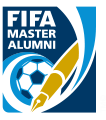The Quarterly Interview #1: Arnaud Le Mintier
In this 1st issue of the FMA Quarterly we have the pleasure to interview, Arnaud Le Mintier, the Head of Broadcaster Servicing at FIFA TV and an alumnus graduated in the 1st edition of the FIFA Master, in 2001.
Arnaud, 47, is French, married, father of three (Marie, 13 years old, Sébastien, 12, Anaëlle, 10), and is one of the founding members – and 1st president – of the FMA.
As a Frenchman, it’s not surprising to find out that one of his favourite sporting moments of all time was the 1998 World Cup. “I was a volunteer at the event and attending the Final was very special”, he says. “Otherwise I will always remember being on the pitch as a volunteer at the UEFA EURO 96 England vs. Spain quarter final in Wembley. The atmosphere was unique, all English fans were singing ‘Football is coming home’ and England ended up winning at penalty shoot-out”.
Before doing the Masters, Arnaud worked for 10 years in the high tech industry and he was planning on doing an MBA, when he found out FIFA was launching a Masters in Sports. “I immediately applied and made sure I would be part of it. I think that I even scared them as I wanted to come over to Neuchatel to check out the facilities and the reality of the programme” he remembers.
After graduation he was invited to be the 1st development manager of the course, but chose to take an internship at FIFA Marketing, while he also applied for a job at ISL “but they went bankrupt before I got interviewed”, he recalls.
Arnaud believes that the FIFA Master was fundamental for the development of his career. He says “. It gave me the connections and entries I needed. I had a solid experience in a top multinational company but the Master gave me the legitimacy I needed to get access to positions in the sports industry”.
FMA Quarterly: What has changed in the FIFA Master in the past 12 years?
Arnaud Le Mintier: A lot. Being part of the first edition was an experience and we have a lot of stories that the latest graduates could probably not imagine. It was however a great adventure. The Master is now much more structured, new graduates receive job offers, the alumni association has grown so much and last but not least the quality of the education has reached best standards.
FMAQ: Competition has certainly increased. What should the FIFA Master do to maintain its position of arguably the top sports business master course on the market?
ALM: First the Master has to keep its core values and principles. It must remain a truly international multi-sports course. We need to keep the pressure on the universities so that they continuously develop the quality of the course. I still believe that we should communicate much more on the programme so that all interested people get a chance to apply. I understand the logistical constraints but for me the real potential reach of the Master is thousands of applications every year.
FMAQ: You were the first president of the FMA. Please tell us what motivated you to create, with other colleagues, this association?
ALM: This was an idea that I had from the very beginning. Thanks to the support of the former CIES President Mr Juvet and together with Roland Chavillon and other fellow alumni we created the Alumni association after a couple of years and managed to get a seat in the Executive Board of the FIFA Master.
FMAQ: In your opinion, how has the FMA evolved since then?
ALM: It has grown significantly as expected and I am glad to see new people always bringing new ideas. Alumni have created so many connections within numerous organisations that graduates can benefit from unique access to job offers yearly.
FMAQ: Do you think the challenges are the same? If they have changed, what are they now?
ALM: The challenge after 12 years is to keep a maximum number of Alumni in the loop. The original motto “think Global, act local” is more relevant than ever. In that respect the regional and local networks are critical for the success of the Alumni association.
FMAQ: In your opinion, what is the most valuable thing the FMA can offer to its members and what do you think should be its priority (priorities)?
ALM: First of all to stay in touch. It is first a social link of a family which is growing every year. Secondly it is obviously a networking tool. The claim of our first gathering in 2006 was “you’ll never work alone”. Third it must remain a key contributor to the development of the Master. We should not necessarily try to copy everything that some MBAs are doing. We need to find our own way. We are small but unique!
